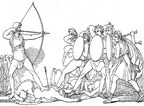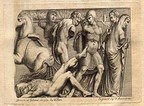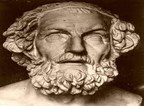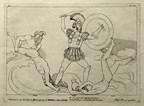The second of the great writings of Homer is Odyssey. Odyssey is an impressive combination of literary power and nobility and has the timeless ability to express the triumph and the disappointments of life. Both epics, Iliad and Odyssey are poems with imperishable beauty and resplendence. The development of the action in Odyssey is more extensive than the Iliad’s but the structure is more harmonic and compound. This writing of Homer describes with an incredible and immersive way the adventurous return (nostos) of the very intelligent hero of the Trojan War and king of Ithaca (island of the Ionian Sea) Odysseus back to his home. The main points of the epic are:
The situation in Ithaca in where Penelope and Telemachus (Odysseus’ wife and son) are weak in front the unruly suitors known as Mnesteres who want to get married with Penelope. The dangerous journey of Odysseus who had to deal with the god of sea, Poseidon. The secret journey of Telemachus to Peloponnese to get informed about what happened to his father and the meetings there with Nestor, Menelaus and Helen. Odysseus narrates his extreme adventures during the 10 years long wandering after the Troy fall to achieve to reach his island, Ithaca.
Odyssey is written in a poetic dialect of Ancient Greece, in 12.110 verses of dactylic hexameter (form of meter in poetry which is appeared in Greek and Latin poems). The writing of Homer, Odyssey, is very famous worldwide and is one of the most translated and read writings, unique for the global literature. The inspiration resources of the epic poem are the heroic tradition and the fairy-tales of sailor-men. In this epic we can discover different themes as the everyday life of people, the love for the motherland, the friendship, the lovers’ faith, the beauty of life and the power of the humans to get ahead with the difficulties.
The main hero – Odysseus
Odysseus (also known as Ulysses in Roman myths) is mentioned in the writing of Homer, Odyssey, as ingenious man with extremely cleverness. He is referred as the instigator and designer of the Trojan Horse. With this device, the Greeks, achieved to get into the town of Troy and destroy it completely. His name means ‘’trouble’’ in the Greek language and truly this man experienced and caused a lot of troubles. He is husband of Penelope, father of Telemachus and son of Laertes and Anticlea, famous as Odysseus the Cunning. A great Greek hero of the Trojan War who granted the win and the glory to the Greeks with his smart creation, the Trojan Horse.
How the adventures of Odysseus started
After the fall of Troy, the 10 years long war was over. The Greek ships started the homecoming journey. But the Olympic gods were really angry with the Greeks because they destroyed and burnt their temples built into Troy. That’s why the gods sent extremely strong winds and wild rough sea to make their journey very difficult. However, all the Greeks went home fast. Only Odysseus roved for 10 years long in distant seas and countries and he passed through a lot of sufferings to get home finally. These sufferings and adventures are recited in the writing of Homer, Odyssey.
Synopsis of the rhapsodies
The Odyssey, as the Iliad, is separated in 24 parts, the rhapsodies which are symbolized with the 24 characters of the Greek alphabet. As the Iliad, the second writing of Homer starts with the invocation of the muse and the presentation of the main subject which is the adventures of Odysseus.
α. the last of the adventures of Odysseus in the island of Calypso. Poseidon blocks the hero’s return back home but the goddess Athena starts to help him. The suitors celebrate in the palace in Ithaca.
β, γ, δ. Telemachus decides to search for his father and goes to Pylos and to Sparta. In Sparta Menelaus celebrates the double wedding of his daughter and his son and informed Telemachus that his father is at the island of Calypso. Back in Ithaca, the suitors plan how to kill Telemachus. Athena solaces Penelope.
ε. Calypso, after the divine will, helps Odysseus to make a pontoon and to leave from the island. After 18 days in the sea, Poseidon perceives that Odysseus is there and causes great thunderstorm. Odysseus is safe from death thanks to Leykothea and reaches the land of the Phaeacians in where falls into deep sleep.
ζ, η, θ. Nausicaa, the daughter of the king of the Phaeacians, goes to the beach with her friends, they found Odyssey and help him. Covered with fog by Athena, Odysseus get into the palace, ask for asylum and starts to describe his sufferings after leaving the Calypso’s island. The king of the Phaeacians promise to help him to go home. The palace has celebration and a singer sings for the achievements of Achilles and Odysseus and the last starts to cry in secret.
ι, κ, λ, μ. Odysseus reveals who is and tells his stories about what happened after his departure from Troy. First, were the Cicones, the land of the Lotus-eaters and the Cyclops Polyphemus. Odysseus escapes after blinding the Cyclops and Poseidon gets mad for the blinding of his son and curses him. Then are the island of Aeolus, the land of the cannibalistic Laestrygonians and the witch-goddess Circe. Odysseus and his men stay at the Circe’s island for one year. Finally, Circe suggested Odysseus to go the land of the dead, there sacrifices and the dead come around the blood. The old prophet Tiresias advises him how to reach home. After this, follow the adventures with the Sirens, the Scylla and the Charybdis and the oxen of the god Helios (Sun).
ν, ξ, ο, π, ρ, σ, τ, υ. Odysseus goes finally to Ithaca with the help and with a lot of gifts from the King of the Phaeacians. He doesn’t reveal who is and starts to plan how to kill the suitors who celebrate into the palace and want to get married with his wife, Penelope.
φ, χ, ψ, ω. Odysseus kills all of the suitors with the Athena’s help. He says to Penelope who is but she doesn’t believe him so Odysseus reveals a secret about their bed construction. They enjoy a night like spouses and they talk about their sufferings during the 10 years of the Odysseus’ absence.
The epic ends with the rage of the relatives of the suitors but Athena meddles in and offers peace and stability.




